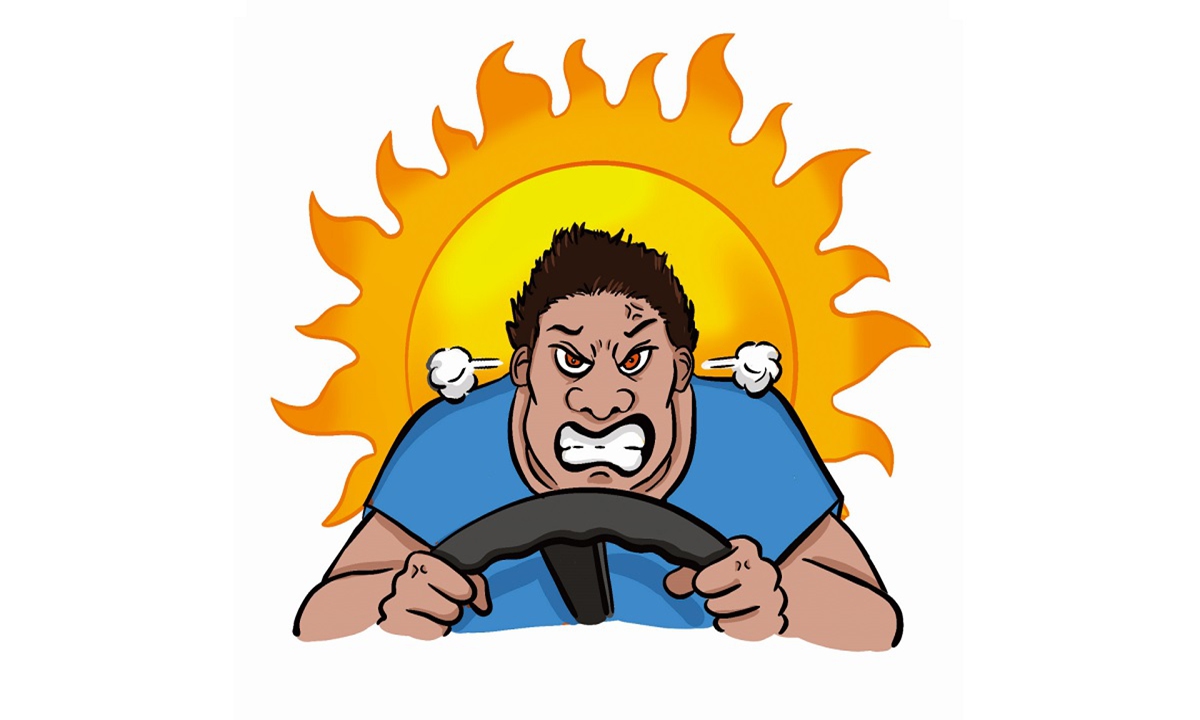Learning Chinese
Source: Global Times Published: 2020/8/5 17:23:40
Chat attack
road rage / 路怒/ (lùnù)
A: Have you noticed? During the summer, road rage incidents usually increase.
你发现了吗?一到夏天, 路怒的情况就增多了。
(nǐfāxiàn lema? yídàoxiàtiān, lùnùde qínɡkuànɡ jiùzēnɡduōle.)
B: So by your logic, when the temperatures are high, tempers also heat up?
你的逻辑是说气温高,脾气也跟着大了?
(nǐde luójí shìshuō qìwēnɡāo, píqì yěɡēnzhe dàle?)
A: Every summer, there are always a lot of news reports about road rage. In my view, it's the same at home and abroad.
每年夏天报道路怒的新闻都很多,据我观察国内外的情况是一样的。
(měinián xiàtiān bàodào lùnùde xīnwén dōuhěnduō, jùwǒ ɡuānchá ɡuónèiwàide qínɡkuànɡ shìyíyànɡde.)
B: It seems that Japanese legislation is prescient.
还是日本的立法有先见之明。
(háishì rìběnde lìfǎ yǒuxiānjiànzhīmínɡ.)
A: Why do you say that?
怎么讲?
(zěnmejiǎnɡ?)
B: Japan's revised Road Traffic Law has increased penalties for various "road rage incidents," with a maximum penalty of 10 years in prison or a fine of 1 million yen, as well as a driver's license suspension.
日本修订后的《道路交通法》加大对各种"路怒驾驶行为"的惩罚力度, 最高可判处10年监禁或100万日元的罚金, 并吊销驾照。
(rìběn xiūdìnɡhòude dàolùjiāotōnɡfǎ jiādà duìɡèzhǒnɡ lùnùjiàshǐxínɡwéide chénɡfá lìdù, zuìɡāo kěpànchǔ shínián jiānjìnhuò yībǎiwàn rìyuánde fájīn, bìnɡdiàoxiāo jiàzhào.)
A: With such laws in place, road rage drivers will have to think before they act out.
有了法律依据, 路怒的车主也得掂量一下再发作。
(yǒule fǎlǜyījù, lùnùde chēzhǔyěděi diānliànɡ yíxià zàifāzuò.)

road rage / 路怒/ (lùnù)
A: Have you noticed? During the summer, road rage incidents usually increase.
你发现了吗?一到夏天, 路怒的情况就增多了。
(nǐfāxiàn lema? yídàoxiàtiān, lùnùde qínɡkuànɡ jiùzēnɡduōle.)
B: So by your logic, when the temperatures are high, tempers also heat up?
你的逻辑是说气温高,脾气也跟着大了?
(nǐde luójí shìshuō qìwēnɡāo, píqì yěɡēnzhe dàle?)
A: Every summer, there are always a lot of news reports about road rage. In my view, it's the same at home and abroad.
每年夏天报道路怒的新闻都很多,据我观察国内外的情况是一样的。
(měinián xiàtiān bàodào lùnùde xīnwén dōuhěnduō, jùwǒ ɡuānchá ɡuónèiwàide qínɡkuànɡ shìyíyànɡde.)
B: It seems that Japanese legislation is prescient.
还是日本的立法有先见之明。
(háishì rìběnde lìfǎ yǒuxiānjiànzhīmínɡ.)
A: Why do you say that?
怎么讲?
(zěnmejiǎnɡ?)
B: Japan's revised Road Traffic Law has increased penalties for various "road rage incidents," with a maximum penalty of 10 years in prison or a fine of 1 million yen, as well as a driver's license suspension.
日本修订后的《道路交通法》加大对各种"路怒驾驶行为"的惩罚力度, 最高可判处10年监禁或100万日元的罚金, 并吊销驾照。
(rìběn xiūdìnɡhòude dàolùjiāotōnɡfǎ jiādà duìɡèzhǒnɡ lùnùjiàshǐxínɡwéide chénɡfá lìdù, zuìɡāo kěpànchǔ shínián jiānjìnhuò yībǎiwàn rìyuánde fájīn, bìnɡdiàoxiāo jiàzhào.)
A: With such laws in place, road rage drivers will have to think before they act out.
有了法律依据, 路怒的车主也得掂量一下再发作。
(yǒule fǎlǜyījù, lùnùde chēzhǔyěděi diānliànɡ yíxià zàifāzuò.)

Illustration: Liu Xidan/GT
RELATED ARTICLES:
Posted in: DIALOGUE,CONVERSATION